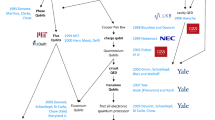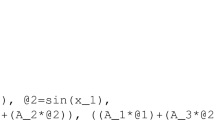Abstract
Variational hybrid quantum classical algorithms are a class of quantum algorithms intended to run on noisy intermediate-scale quantum (NISQ) devices. These algorithms employ a parameterized quantum circuit (ansatz) and a quantum-classical feedback loop. A classical device is used to optimize the parameters in order to minimize a cost function that can be computed far more efficiently on a quantum device. The cost function is constructed such that finding the ansatz parameters that minimize its value, solves some problem of interest. We focus specifically on the variational quantum linear solver, and examine the effect of several gradient-free and gradient-based classical optimizers on performance. We focus on both the average rate of convergence of the classical optimizers studied, as well as the distribution of their average termination cost values, and how these are affected by noise. Our work demonstrates that realistic noise levels on NISQ devices present a challenge to the optimization process. All classical optimizers appear to be very negatively affected by the presence of realistic noise. If noise levels are significantly improved, there may be a good reason for preferring gradient-based methods in the future, which performed better than the gradient-free methods with only shot-noise present. The gradient-free optimizers, simultaneous perturbation stochastic approximation (SPSA) and Powell’s method, and the gradient-based optimizers, AMSGrad and BFGS performed the best in the noisy simulation, and appear to be less affected by noise than the rest of the methods. SPSA appears to be the best performing method. COBYLA, Nelder–Mead and Conjugate-Gradient methods appear to be the most heavily affected by noise, with even slight noise levels significantly impacting their performance.








Similar content being viewed by others
References
Shor, P.W.: Polynomial-time algorithms for prime factorization and discrete logarithms on a quantum computer. SIAM J. Comput. 26(5) (1997)
Coppersmith, D.: An approximate fourier transform useful in quantum factoring. arXiv:quant-ph/0201067
Harrow, A.W., Hassidim, A., Lloyd, S.: Quantum algorithm for linear systems of equations. Phys. Rev. Lett. 15(103), 150502 (2009)
Peruzzo, A., McClean, J., Shadbolt, P., Yung, M.-H., Zhou, X.-Q., Love, P.J., Aspuru-Guzik, A., O’Brien, J.L.: A variational eigenvalue solver on a photonic quantum processor. Nat. Commun. 5, 4213 (2014)
Preskill, J.: Quantum computing in the NISQ era and beyond. Quantum 2, 79 (2018)
Sung, K.J., Yao, J., Harrigan, M.P., Rubin, N.C., Jiang, Z., Lin, L., Babbush, R., McClean, J.R.: Using models to improve optimizers for variational quantum algorithms. Quant. Sci. Technol. 5(4), 044008 (2020)
Wierichs, D., Gogolin, C., Kastoryano, M.: Avoiding local minima in variational quantum eigensolvers with the natural gradient optimizer. Phys. Rev. Res. 2, 043246 (2020)
Lavrijsen, W., Tudor, A., Müller, J., Ianchu, C., Jong, W.: Classical optimizers for noisy intermediate-scale quantum devices. In: 2020 IEEE International Conference on Quantum Computing and Engineering, pp. 267–277 (2020). arXiv:2004.03004
Leng, Z., Mundada, P., Ghadimi, S., Houck, A.: Robust and efficient algorithms for high-dimensional black-box quantum optimization (2019). arXiv:1910.03591
Nannicini, G.: Performance of hybrid quantum/classical variational heuristics for combinatorial optimization. Phys. Rev. E 99, 013304 (2019)
Dervovic, D., Herbster, M., Mountney, P., Severini, S., Usher, N., Wossnig, L.: Quantum linear systems algorithms: a primer (2018). arXiv:1802.08227
Bravo-Prieto, C., LaRose, R., Cerezo, M., Subaşı, Y., Cincio, L., Coles, P.J.: Variational quantum linear solver: a hybrid algorithm for linear systems (2019). arXiv:1909.05820
Huang, H.-Y., Bharti, K., Rebentrost, P.: Near-term quantum algorithms for linear systems of equations (2019). arXiv:1909.07344
Powell, M. J. D.: A direct search optimization method that models the objective and constraint functions by linear interpolation. Adv. Optim. Numer. Anal. pp. 51–67 (1994)
Nelder, J.A., Mead, R.: A simplex method for function minimization. Comput. J. 7(4), 308–313 (1965)
Powell, M.J.D.: An efficient method for finding the minimum of a function of several variables without calculating derivatives. Comput. J. 7(2), 155–162 (1964)
Spall, J.C.: Multivariate stochastic approximation using a simultaneous perturbation gradient approximation. IEEE Trans. Autom. Control 37(3), 332–341 (1992)
Fletcher, R.: A new approach to variable metric algorithms. Comput. J. 13(3), 317–322 (1970)
Byrd, R.H., Lu, P., Nocedal, J., Zhu, C.: A limited memory algorithm for bound constrained optimization. SIAM J. Sci. Comput. 16, 1190–1208 (1995)
Hestenes, M.R., Stiefel, E.: Methods of conjugate gradients for solving linear systems. J. Res. Natl. Bureau Stand 49(6) (1952)
Boggs, P.T., Tolle, J.W.: Sequential quadratic programming. Acta Numerica 4, 1–51 (1996)
Kingma, D.P., Ba, J.L.: ADAM: a method for stochastic optimization (2017). arXiv:1412.6980
Reddi, S.J., Kale, S., Kumar, S.: On the convergence of ADAM and beyond (2018). arXiv:1904.09237
Mitarai, K., Negoro, M., Kitagawa, M., Fujii, K.: Quantum circuit learning. Phys. Rev. A 98, 032309 (2019)
Acknowledgements
This work is based upon research supported by the South African Research Chair Initiative, Grant No. UID 64812 of the Department of Science and Innovation of the Republic of South Africa and National Research Foundation of the Republic of South Africa.
Author information
Authors and Affiliations
Corresponding author
Additional information
Publisher's Note
Springer Nature remains neutral with regard to jurisdictional claims in published maps and institutional affiliations.
Rights and permissions
About this article
Cite this article
Pellow-Jarman, A., Sinayskiy, I., Pillay, A. et al. A comparison of various classical optimizers for a variational quantum linear solver. Quantum Inf Process 20, 202 (2021). https://doi.org/10.1007/s11128-021-03140-x
Received:
Accepted:
Published:
DOI: https://doi.org/10.1007/s11128-021-03140-x




